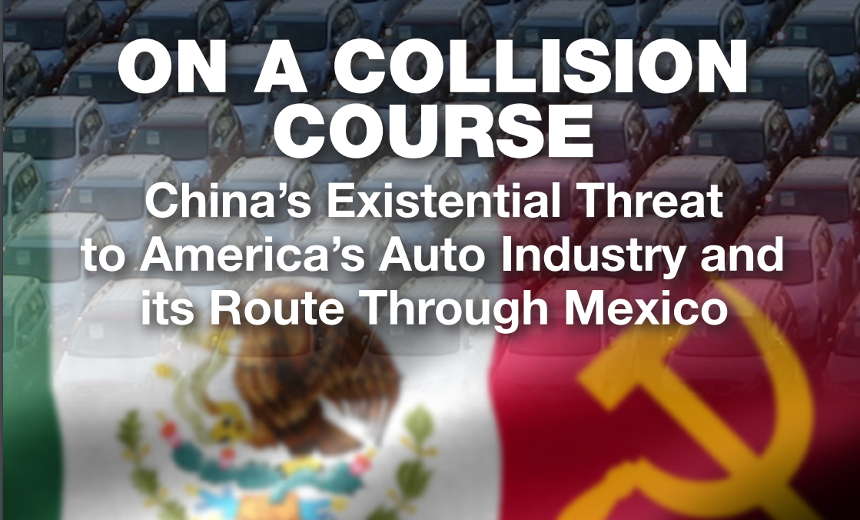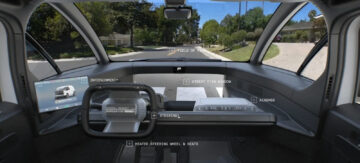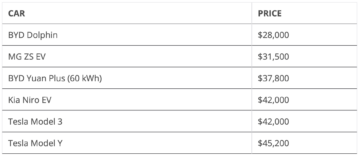
Sign up for daily news updates from CleanTechnica on email. Or follow us on Google News!
The Alliance for American Manufacturing is a non-profit, non-partisan partnership formed in 2007 by some of America’s leading manufacturers and the United Steelworkers. Its mission is to strengthen American manufacturing and create new private sector jobs through smart public policies. It believes an innovative and growing manufacturing base is vital to America’s economic and national security, as well as providing good jobs for future generations. It also believes EVs built in Mexico by Chinese companies could be a threat to America’s economic security.
On February 20, 2024, it issued a report warning that cheap Chinese electric cars manufactured in Mexico could be the death knell for US automakers. That report warns about “China’s Existential Threat To America’s Auto Industry And Its Route Through Mexico.” The focus of the report has been turbocharged by reports that BYD is scouting locations for a new factory in Mexico.
China, Mexico, & USMCA
The problem, of course, is that Mexico is an integral part of the United States-Mexico-Canada Agreement (USMCA) that became effective on July 1, 2020, replacing the previous North American Free Trade Agreement (NAFTA). By virtue of that agreement, products manufactured in Mexico can enter the United States without paying import taxes or duties. The basic idea is Mexico, the United States, and Canada are all one big happy family where everyone works together collaboratively to create good jobs for all. That’s the theory. The reality is rather more nuanced.
Picture this. Electric cars built in Mexico will be eligible — if they meet all the requirements on battery materials and component sourcing — for the full $7500 federal tax credit/rebate. How is that going to play in Peoria? “The introduction of cheap Chinese autos — which are so inexpensive because they are backed with the power and funding of the Chinese government — to the American market could end up being an extinction-level event for the U.S. auto sector,” the AAM report warns.
The AAM argues the United States should work to prevent automobiles and parts manufactured in Mexico by companies headquartered in China from benefiting from the USMCA. “The commercial back door left open to Chinese auto imports should be shut before it causes mass plant closures and job losses in the United States,” it says.
BYD Is Disrupting The Disruptors
BYD is the cause of most of this angst. It sells the Qin Pluis plug-in hybrid in China for just $14,000. Is it a car Americans would buy? Maybe, maybe not, but the idea that a company can produce an actual car so cheaply and sell it at a profit (we presume) scares the bejezus out of American car companies. Even Elon Musk is worried and he knows a thing or two about what it costs to build cars in China.
BYD is really just the tip of the spear. Once it sets up shop in Mexico, other Chinese electric car companies like Nio and Xpend and Zeekr are sure to follow. So the US is on the horns of a dilemma largely of its own making. When USMCA was finalized less than 4 years ago, no one could imagine Chinese made cars might one day be manufactured in Mexico. But the market has changed dramatically in less than four years.
In a statement, the Chinese embassy in Washington told Reuters that China’s automobile exports “reflect the high-quality development and strong innovation of China’s manufacturing industry. The leapfrog development of China’s auto industry has provided cost-effective products with high quality to the world.”
The Law Of Unintended Consequences
The US has always been a strong advocate for forcing other companies to open their markets (viz, China). Now the shoe is on the other foot, which must be a bit disconcerting to the free traders who thought the benefits of globalization would always favor America over all other nations. What no one anticipated was how the Chinese central government would create special areas of interest in electronics, batteries, and automobile manufacturing that would give China a huge advantage in those industries. But now the servant has become the master. It is like the limerick by William Monkhouse:
There was a young lady of Niger
Who smiled as she rode on a tiger;
They returned from the ride
With the lady inside,
And the smile on the face of the tiger.
Members of Congress from both parties are beating the drum for special levies that would apply to vehicles made by Chinese owned companies who manufacture them in Mexico. How that could possibly square with the various free trade agreements the US has entered into and the rules of the World Trade Organization is not mentioned. What isn’t being said is that Ford, GM, Mercedes, and others all build cars in Mexico for sale in the US. How can you penalize corporations from one country and not others? That’s the nub of the problem.
Those members of Congress are urging US Trade Representative Katherine Tai to boost the 27.5% tariff on Chinese vehicles and said her office “must also be prepared to address the coming wave of (Chinese) vehicles that will be exported from our other trading partners, such as Mexico, as (Chinese) automakers look to strategically establish operations outside of (China).”
The Takeaway
There is more than a little irony to all this huffing and puffing about an “existential crisis.” The real existential crisis is global heating caused in part by the tailpipe emissions from conventional cars that traditional automakers manufacture by the millions. From one perspective, affordable electric cars from Chinese-owned companies would help reduce carbon emissions in America and Europe. How odd that people can see one existential crisis but not another.
Europe is just as concerned about a flood of Chinese cars damaging its car makers as is the US. BYD has just sent 5000 EVs to Europe on its own ocean-going car transporter. The auto industry supports millions of people who either help make vehicles or the parts that go into them. Many more are employed in the sale, financing, insuring, repairing and distribution of them. If the car companies were to suffer a devastating loss of business, the impact on all those direct and indirect jobs would be enormous.
An old adage says, “Be careful what you wish for; you just might get it.” Many wish for affordable electric cars. The Chinese seem set to deliver them. Not that BYD cars made in Mexico will be priced the same as they are in China. Mexican labor rates may be lower than than the US, but they are still higher higher than they are in China. That $14,000 Qin Plus PHEV in China might cost $28,000 in a US showroom. So the threat may not be quite as dire as people are saying.
This is a thorny thicket. No one wants to see American or European jobs in the auto sector lost, but how to manage the challenge of low cost electric cars from Chinese companies is a question with no easy answer. Knee-jerk protectionism doesn’t seem like the ideal answer, but what is? Please share your thoughts with the CleanTechnica community in the comments section.
Have a tip for CleanTechnica? Want to advertise? Want to suggest a guest for our CleanTech Talk podcast? Contact us here.
Latest CleanTechnica TV Video
[embedded content]
I don’t like paywalls. You don’t like paywalls. Who likes paywalls? Here at CleanTechnica, we implemented a limited paywall for a while, but it always felt wrong — and it was always tough to decide what we should put behind there. In theory, your most exclusive and best content goes behind a paywall. But then fewer people read it!! So, we’ve decided to completely nix paywalls here at CleanTechnica. But…
Thank you!
Advertisement
CleanTechnica uses affiliate links. See our policy here.
- SEO Powered Content & PR Distribution. Get Amplified Today.
- PlatoData.Network Vertical Generative Ai. Empower Yourself. Access Here.
- PlatoAiStream. Web3 Intelligence. Knowledge Amplified. Access Here.
- PlatoESG. Carbon, CleanTech, Energy, Environment, Solar, Waste Management. Access Here.
- PlatoHealth. Biotech and Clinical Trials Intelligence. Access Here.
- Source: https://cleantechnica.com/2024/02/25/aam-calls-cheap-chinese-evs-built-in-mexico-an-extinction-level-event/
- :has
- :is
- :not
- :where
- $UP
- 000
- 1
- 15%
- 20
- 2020
- 2024
- 27
- 36
- 4
- 5000
- a
- About
- actual
- address
- ADvantage
- Advertise
- advocate
- Affiliate
- affordable
- ago
- Agreement
- agreements
- All
- also
- always
- america
- American
- Americans
- an
- and
- Another
- answer
- Anticipated
- Apply
- ARE
- areas
- Argues
- AS
- At
- auto
- automakers
- automobile
- automobiles
- back
- backed
- base
- basic
- batteries
- battery
- BE
- became
- because
- become
- been
- before
- behind
- being
- believes
- benefiting
- benefits
- BEST
- Big
- Bit
- boost
- both
- both parties
- build
- built
- business
- but
- buy
- by
- byd
- Calls
- CAN
- Canada
- car
- carbon
- carbon emissions
- careful
- cars
- caused
- causes
- central
- challenge
- changed
- cheap
- cheaply
- China
- Chinas
- chinese
- chip
- cleantech
- Cleantech Talk
- coming
- comments
- commercial
- community
- Companies
- company
- completely
- component
- concerned
- Congress
- content
- conventional
- Corporations
- Cost
- cost-effective
- Costs
- could
- country
- course
- create
- crisis
- damaging
- day
- Death
- decide
- decided
- deliver
- devastating
- Development
- dilemma
- dire
- direct
- distribution
- Doesn’t
- don
- Door
- dramatically
- drum
- easy
- Economic
- Effective
- either
- Electric
- electric car
- electric cars
- Electronics
- eligible
- Elon
- Elon Musk
- embedded
- Emissions
- employed
- end
- enormous
- Enter
- entered
- establish
- Ether (ETH)
- Europe
- European
- Even
- Event
- everyone
- evs
- Exclusive
- existential
- exports
- extinction
- Face
- factory
- family
- favor
- February
- Federal
- felt
- fewer
- finalized
- financing
- Focus
- follow
- Foot
- For
- forcing
- Ford
- formed
- four
- Free
- from
- full
- funding
- future
- generations
- get
- Give
- Global
- globalization
- GM
- Go
- Goes
- going
- good
- Government
- Growing
- Guest
- happy
- he
- headquartered
- help
- her
- here
- High
- high-quality
- higher
- How
- How To
- HTTPS
- huge
- idea
- ideal
- if
- imagine
- Impact
- implemented
- import
- imports
- in
- industries
- industry
- inexpensive
- Innovation
- innovative
- inside
- integral
- interest
- into
- Introduction
- irony
- IT
- ITS
- Job
- Jobs
- jpg
- July
- just
- knows
- labor
- lady
- largely
- Law
- leading
- left
- less
- Level
- like
- likes
- Limited
- links
- little
- locations
- Look
- loss
- losses
- lost
- Low
- lower
- made
- make
- Makers
- Making
- manage
- manufactured
- Manufacturers
- manufacturing
- manufacturing industry
- many
- Market
- Markets
- Mass
- master
- materials
- May..
- maybe
- Media
- Meet
- Members
- mentioned
- Mexico
- might
- millions
- Mission
- more
- most
- Musk
- must
- National
- national security
- Nations
- Need
- New
- news
- nio
- no
- non-profit
- North
- now
- nuanced
- of
- Office
- Old
- on
- once
- ONE
- open
- Operations
- or
- organization
- Other
- Others
- our
- out
- outside
- over
- own
- owned
- part
- parties
- partners
- Partnership
- parts
- paying
- People
- perspective
- plant
- plato
- Plato Data Intelligence
- PlatoData
- Play
- player
- please
- plus
- podcast
- policies
- policy
- possibly
- power
- prepared
- prevent
- previous
- private
- private sector
- Problem
- produce
- Products
- Profit
- provided
- providing
- public
- publish
- put
- quality
- question
- quite
- Rates
- rather
- Read
- Reader
- Reality
- really
- reduce
- repairing
- report
- Reports
- representative
- Requirements
- Reuters
- Route
- rules
- s
- Said
- sale
- same
- saying
- says
- Section
- sector
- security
- see
- seem
- sell
- Sells
- sent
- set
- Sets
- Share
- she
- Shop
- should
- shut
- smart
- So
- some
- Sourcing
- special
- square
- Statement
- States
- Still
- Stories
- Strategically
- Strengthen
- strong
- such
- suffer
- suggest
- support
- Supports
- sure
- T
- Talk
- tax
- Taxes
- team
- than
- that
- The
- the world
- their
- Them
- then
- theory
- There.
- they
- thing
- this
- those
- thought
- threat
- Through
- Tiger
- tip
- to
- together
- told
- tough
- trade
- Traders
- Trading
- traditional
- tv
- two
- u.s.
- United
- United States
- Updates
- urging
- us
- uses
- various
- Ve
- Vehicles
- Video
- vital
- want
- wants
- warning
- Warns
- was
- washington
- Wave
- we
- WELL
- were
- What
- What is
- when
- which
- while
- WHO
- will
- william
- wish
- with
- without
- Work
- works
- world
- worried
- would
- would give
- write
- Wrong
- years
- you
- young
- Your
- youtube
- zephyrnet





